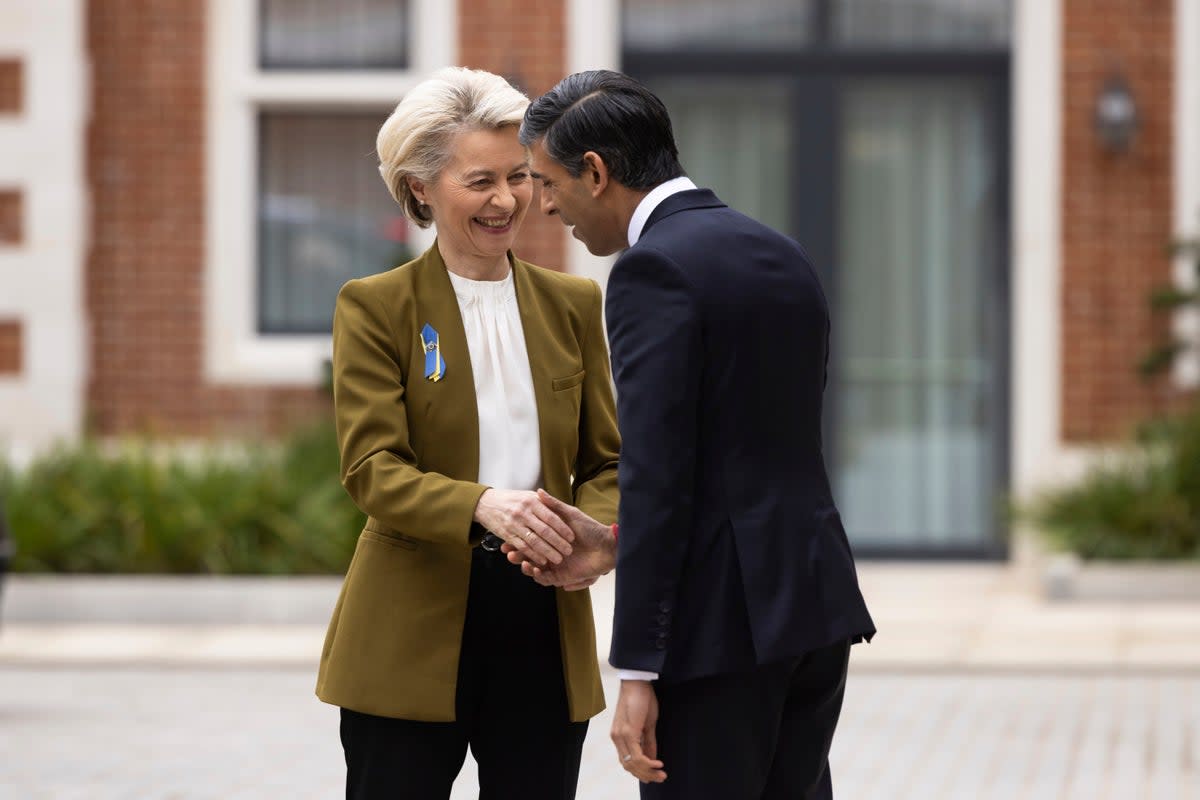Voices: Northern Ireland Protocol: The Top 10 ways Brexit finally got done

- Oops!Something went wrong.Please try again later.
1. Get rid of Boris Johnson
He “got Brexit done” in the crude sense of ending our EU membership, but at the cost of a slapdash and flawed deal that he wanted to change almost as soon as he had signed it. Removing him from the scene was the essential condition of today’s agreement, as he had limited credibility and trust with EU leaders.
2. Put Cleverly, Heaton-Harris and Baker in charge
To be fair to Liz Truss, who took over the negotiations as foreign secretary when David Frost resigned from Johnson’s cabinet in December 2021, she appointed James Cleverly to the foreign office when she became prime minister, and Chris Heaton-Harris to the Northern Ireland Office with Steve Baker, both former chairs of the European Research Group of backbench Tory MPs.
3. Neutralise the ERG
With two key members in government, the European Research Group is not the force it was: as was graphically illustrated by its failure to agree which candidate to back in the first Tory leadership election last year. Bill Cash, the keeper of the Eurosceptic flame, will convene a “star chamber” of Leaver lawyers to scrutinise the text of the deal, but even a thumbs-down from them is unlikely to stir a rebellion big enough to threaten Rishi Sunak’s majority.
4. Keep the DUP at arm’s length
It seemed an odd way to conduct negotiations: refusing to consult the Democratic Unionist Party, the one party whose acceptance of the agreement was critical to success. Sunak believed that if it had been involved early on, it would have blocked the talks by making impossible demands, so he instructed negotiators to take the party’s seven public demands as their template. The suspicion, including among some of the harder-to-please members of the DUP, is that Sir Jeffrey Donaldson, the party leader, has given the prime minister deniable indications that he thinks he can sell the deal to his troops.
5. Red and green channels
The easy part of the negotiation, to give effect to what Johnson thought he had agreed in the first place, which is that goods would pass freely between Northern Ireland and the rest of the UK, unless they were going from Great Britain to the Irish Republic via Northern Ireland. The EU had been unhelpful about operating this principle, wanting a wide definition of goods “at risk” of onward passage to the Republic. Johnson’s departure undoubtedly made this bit even easier.
6. Taxation
Sunak was surprised when as chancellor he simplified alcohol taxes for the rest of the UK and found that he couldn’t legislate for Northern Ireland because the EU single market rules limit tax changes. The same happened over plans to cut VAT on gas and electricity bills as the energy price crisis deepened: EU law prevented it in Northern Ireland. The EU seems to have taken the pragmatic view that divergent taxes there are not much of a threat to the single market.
7. State aid rules
Similarly with state aid rules designed to stop unfair subsidies. Again, the EU seems to have recognised that carving out an exception to these rules poses no serious threat to the integrity of the single market. These are nevertheless significant concessions by the EU.
8. Norway-style consent to future EU law
The deal seems to include some complex mechanisms for allowing the Northern Ireland Assembly a say over future EU law – just as the governments of Norway and Iceland have the right to be consulted, because they are also in the EU single market without being EU members. This is probably the part of the deal most involving the kind of “creative ambiguity” that was so essential to previous negotiations, from the Good Friday Agreement onwards. Will the DUP be satisfied by a right to be consulted, but no guarantee of being able to change EU decisions that might affect Northern Ireland?
9. Limit the role of the Court of Justice of the EU
The deal is also expected to include mechanisms for the arbitration of disputes about EU single market rules that do not involve the EU court, but ultimately, if elements of the single market apply in Northern Ireland, the Court of Justice of the EU (CJEU) must have the final decision. Another tough one for the DUP to accept.
10. Calm attention to detail
In the end, the most important factor in achieving this agreement is Sunak’s reasonableness, his good faith and his attention to detail. Despite being a more authentic Brexiteer than Johnson, he seems to command the respect of EU leaders. In style, he is in the mould of the technocratic problem-solvers who dominate continental European politics, and shares their horror of the chaotic and unreliable – if entertaining – approach of his predecessor.

